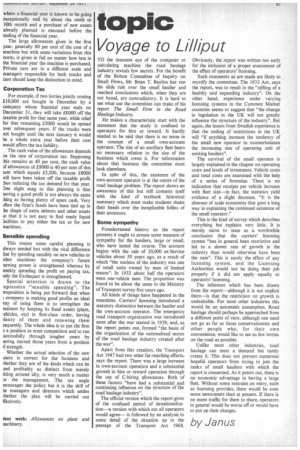topic
Page 53

If you've noticed an error in this article please click here to report it so we can fix it.
Voyage to Lilliput
TO the innocent eye of the computer or calculating machine the road haulage industry reveals few secrets. For the benefit of the Bolton Committee of Inquiry on Small Firms, Mr Brian T. Bayliss has run his slide rule over the small haulier and reached conclusions which, when they are not banal, are contradictory. It is hard to see what use the committee can make of his report The Small Firm in the Road Haulage Industry.
He makes a characteristic start with the statement that the study is confined to operators for hire or reward. It hardly needed to be said that there is no sense in the concept of a small own-account operator. The size of an ancillary fleet bears no necessary relation to the size of the business which owns it. For information about that business the committee must look elsewhere.
In spite of this, the existence of the own-account operator is at the centre of the road haulage problem. The report shows an awareness of this but still contents itself with the kind of textbook historical summary which must make students shake their heads over the inexplicable follies of their ancestors.
Some sympathy
Foreshortened history as the report presents it ought to arouse some measure of sympathy for the hauliers, large or small, who have lasted the course. The account begins with the sale of 20,000 ex-Service vehicles about 50 years ago, as a result of which "the nucleus of the industry was one of small units owned by men of limited means". In 1932 about half the operators were one-vehicle men. The proportion was found to be about the same in the Ministry of Transport survey five years ago.
All kinds of things have happened in the meantime. Carriers' licensing introduced a statutory distinction between the haulier and the own-account operator. The emergency road transport organization was introduced soon after the war started in 1939, and, as the report points out, formed "the basis of the organization of the nationalized sector of the road haulage industry created after the war".
Apart from this creation, the Transport Act 1947 had two other far-reaching effects, says the report. There was a large increase in own-account operation and a substantial growth in hire or reward operation through the use of C-hiring allowances. Both of these factors "have had a substantial and continuing influence on the structure of the road haulage industry".
The official version which the report gives of the confused period of denationalization—a version with which not all operators would agree— is followed by an analysis in some detail of the situation up to the passage of the Transport Act 1968. Obviously, the report was written too early for the inclusion of a proper assessment of the effect of operators' licensing.
Such comments as are made are likely to mystify the committee. The 1933 Act, says the report, was to result in the "stifling of a healthy and expanding industry". On the other hand, experience under varying licensing systems in the Common Market countries seems to suggest that "the change in legislation in the UK will not greatly influence the structure of the industry". But again, the lesson from Swedish experience is that the ending of restrictions in the UK will "if anything increase the tendency of the small new operator to counterbalance the increasing size of operating unit of existing hauliers".
The survival of the small operator is largely explained in the chapter on operating costs and levels of investment. Vehicle costs and total costs are examined with the help of a series of formulae. There is no indication that receipts per vehicle increase with fleet size—in fact, the statistics yield evidence of a slight decrease. "It is the absence of scale economies that goes a long way in explaining the continued existence of the small operator."
This is the kind of survey which describes everything but explains very little. It is merely naive to state as a. worthwhile conclusion that the carriers' licensing system "has in general been restrictive and led to a slower rate of growth in the industry than would otherwise have been the case". This is surely the effect of any licensing system, and the Licensing Authorities would not be doing their job properly if it did not apply equally to operators' licensing.
The inference which has been drawn from the report—although it is not explicit there—is that the restriction on growth is undesirable. For most other industries this would be an automatic assumption. Road haulage should perhaps be approached from a different point of view, although one need not go as far as those conservationists and other people who, for their own convenience, would like to see as few lorries on the road as possible.
Unlike most other industries, road haulage can meet a demand but rarely create it. This does not prevent numerous hopeful operators from trying to join the ranks of small hauliers with which the report is concerned. As it points out, there is no economic advantage in having a large fleet. Without some restraint on entry, such as licensing provides, there would be even more newcomers than at present. If there is no more traffic for them to share, operators in general would be worse off or would have to put up their charges.
by Janus










































































































